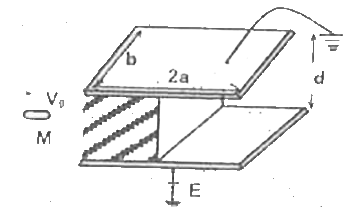A parallel plate capacitor is filled with a uniform dielectric , maximum charge that can be given to it does not depends upon
Dielectric constant of the dielectric
Dielectric strenth of the dielectric
Separtion between the plates
Area of the plates
The correct Answer is:C
To solve the problem, we need to analyze the factors affecting the maximum charge that can be stored in a parallel plate capacitor filled with a uniform dielectric.
1. Understanding the Capacitor: A parallel plate capacitor consists of two plates separated by a distance d. When a dielectric material is inserted between the plates, it affects the capacitor's ability to store charge.
2. Key Parameters:
- q: Charge on the plates.
- A: Area of the plates.
- d: Separation between the plates.
- k: Dielectric constant of the material.
- ϵ0: Permittivity of free space.
3. Charge Density: The charge density σ on the plates is given by:
σ=qA
4. Electric Field: The electric field E between the plates of the capacitor filled with a dielectric is given by:
E=σkϵ0=qkAϵ0
5. Dielectric Strength: The maximum electric field strength that the dielectric can withstand without breaking down is denoted as E0.
6. Maximum Charge: The maximum charge qmax that can be stored in the capacitor is determined by the dielectric strength:
E0=qmaxkAϵ0
Rearranging this gives:
qmax=kAϵ0E0
7. Factors Affecting Maximum Charge: From the equation qmax=kAϵ0E0, we can see that the maximum charge depends on:
- The dielectric constant k
- The area of the plates A
- The dielectric strength E0
8. Independence from Separation: The maximum charge qmax does not depend on the separation d between the plates. This is because the formula does not include d as a variable.
Conclusion:
Thus, the maximum charge that can be given to a parallel plate capacitor filled with a uniform dielectric does not depend on the separation between the plates.
- q: Charge on the plates.
- A: Area of the plates.
- d: Separation between the plates.
- k: Dielectric constant of the material.
- ϵ0: Permittivity of free space.
σ=qA
E=σkϵ0=qkAϵ0
E0=qmaxkAϵ0
Rearranging this gives:
qmax=kAϵ0E0
- The dielectric constant k
- The area of the plates A
- The dielectric strength E0
Thus, the maximum charge that can be given to a parallel plate capacitor filled with a uniform dielectric does not depend on the separation between the plates.
Topper's Solved these Questions
Similar Questions
Parallel Plate Capacitors with and without Dielectric
View SolutionThe capacitance of a capacitor does not depend upon
View SolutionHalf of the space between the plates of a parallel plate capacitor is filled with dielectric material of constant K. Then which of the plots are possible?
View SolutionThe space between plates of a parallel plate capacitor is filled by a dielectric and it is charged and then battery is removed. Now dielectric slab is slowly drawn out of the capacitor parallel to the plates. The variation of the potential of capacitor with respect to the length of the dielectric plate drawn out is
View SolutionA parallel-plate capacitor is filled with a delectric meterial having resistivity(ρ)and dielectric constant K.The capcitor is charged and disconnected from the charging source. The capacitor is slowly discharged through the dielectric.Show that the time constant of the discharge is independent of all gepmetrical parameters like the plate area or separation between the plates. Find this time constant.
View SolutionA parallel plate capacitor is charged. If the plates are pulled apart
View SolutionA parallel-plate capacitor is filled with a dielectric up to one-half of the distance between the plates.The manner in which the potential between the plates varies is illustrated in the figure. Which half (1or2) of the space between the plates is filled with the dielectric and what will be the distribution of the potential after the dielectric is taken out of the capacitor provided that (a) the charges on the plates are conserved or (b) the potential difference across the capacitor is conserved?
View SolutionAn LR circuit with a battery connected at t =0. Which of the following quantities will be zero just after the connection?
View SolutionA parallel plate capacitor is half filled with a dielectric slab of dielectric constant (K) and mass M. Capacitor is connected to a cell of e.m.f. E. Plates are held fixed on horizontal surface. A bullet of mass M hits the dielectric elastically and it is found that the dielectric slab just leaves out the capacitor. Find the speed of the bullet?

View SolutionA parallel plate capacitor is filled by a dielectric whose relative permittivity varies with the applied voltage (U) as ε=αU where alpha =2V−1. A similar capacitor with no dielectric is charged to U0=78V. It is then is connected to the uncharged capacitor with the dielectric. Find the final voltage on the capacitors.
View Solution
